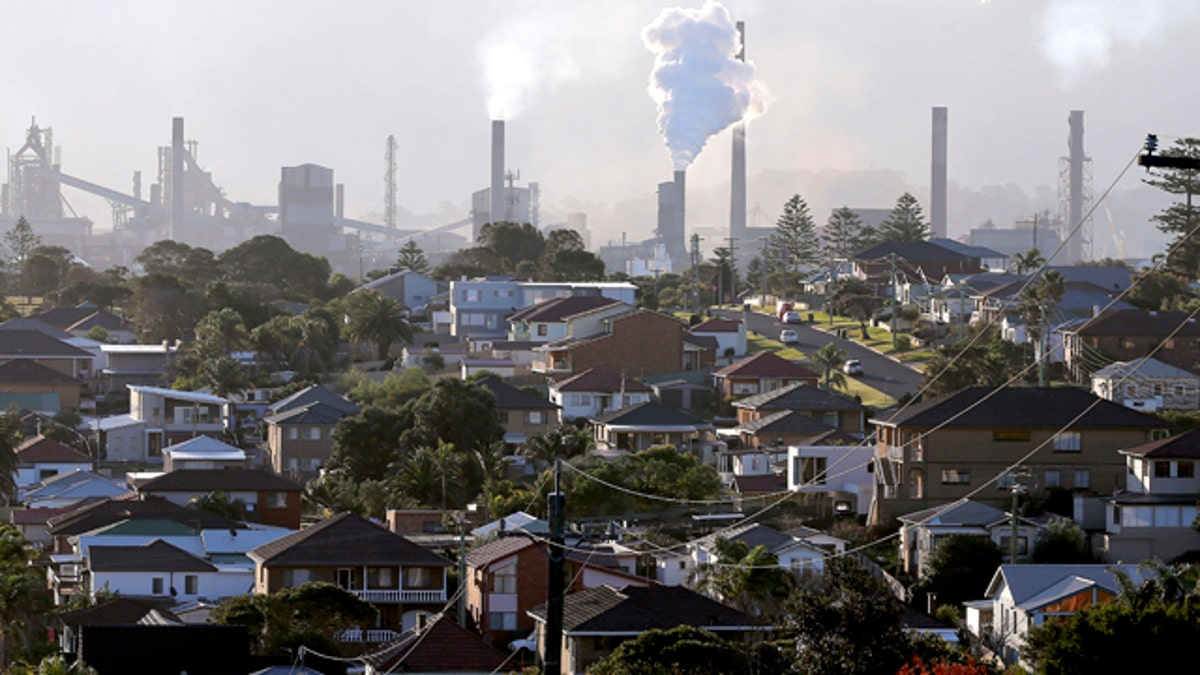
FILE - In this July 2, 2014 file photo, smoke billows out of a chimney stack of steel works factories in Port Kembla, south of Sydney. (AP Photo/Rob Griffith, File)
SYDNEY – Australia's government repealed a much-maligned carbon tax on the nation's worst greenhouse gas polluters on Thursday, ending years of contention over a measure that became political poison for the lawmakers who imposed it.
The Senate voted 39 to 32 to axe the 24.15 Australian dollar ($22.60) tax per metric ton of carbon dioxide that was introduced by the center-left Labor government in July 2012. Conservative lawmakers burst into applause as the final tally was announced.
Prime Minister Tony Abbott's conservative coalition government rose to power last year on the promise of getting rid of the tax, assuring voters that removing it would reduce household electricity bills. He plans to replace the measure with a taxpayer-financed AU$2.55 billion fund to pay industry incentives to use cleaner energy.
"Today, the tax that you voted to get rid of is finally gone: a useless, destructive tax which damaged jobs, which hurt families' cost of living and which didn't actually help the environment," Abbott told reporters in Canberra.
Australia is one of the world's worst greenhouse gas emitters per capita, largely because of its heavy reliance on the nation's vast reserves of cheap coal for electricity.
Opposition leader Bill Shorten lashed out at Abbott after the vote, dubbing him an "environmental vandal."
"Today, Tony Abbott has made Australia the first country in the world to reverse action on climate change," Shorten told reporters. "History will judge Tony Abbott very harshly for refusing to believe in genuine action on climate change. Tony Abbott is sleepwalking Australia to an environmental and economic disaster."
The carbon tax, charged to about 350 of Australia's biggest carbon polluters, was controversial from the start. Former Prime Minister Julia Gillard had initially vowed not to introduce a tax on carbon emissions. But after her Labor party was elected in 2010, she needed the support of the minor Greens party to form a government -- and the Greens wanted a carbon tax. Gillard agreed, infuriating a public that viewed the measure's imposition as a broken promise.
Labor's popularity plummeted, particularly when consumers saw their power bills soar. In reality, the tax accounted for a relatively small portion of that increase, but many blamed it for the hike nonetheless.
In a desperate bid to improve their standing with the public, Labor replaced Gillard with previous Prime Minister Kevin Rudd, who promised to get rid of the tax and transition it earlier than planned to a cap-and-trade scheme, which would have significantly lowered the per-ton carbon price.
But it proved too little, too late. Abbott's party swept to power in last year's elections by vowing to get rid of the tax for good.
In a fiery speech ahead of Thursday's vote, Sen. Christine Milne, leader of the Greens, called it an "appalling day for Australia."
"A vote for the abolition of the clean energy package is a vote for failure," she said. "If this parliament votes to abandon the clean energy package, you are voting against the best interests of the nation."
